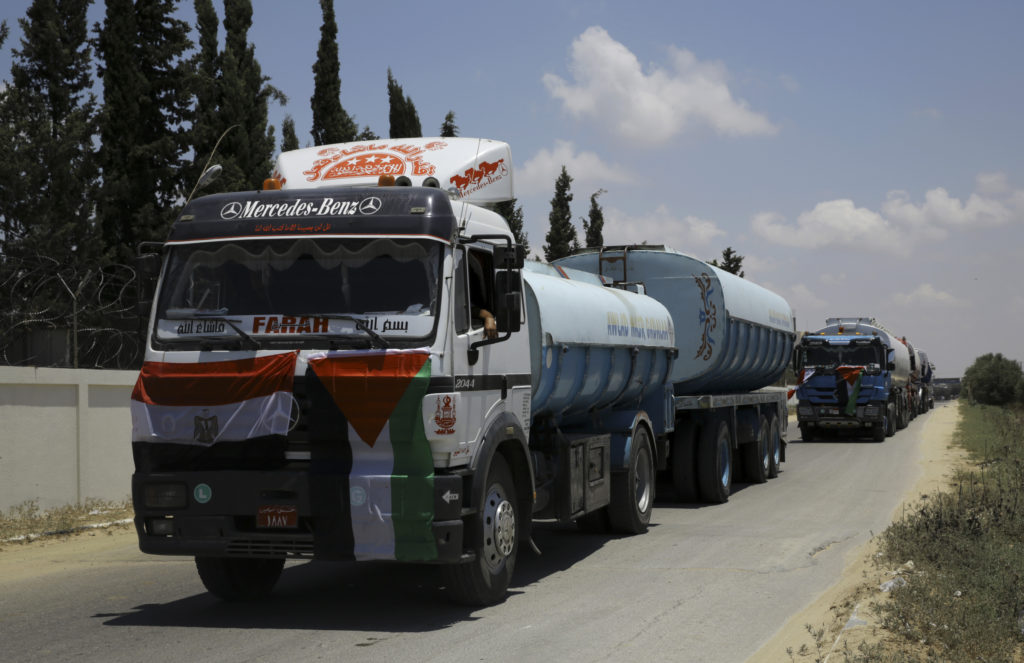After international pressure, the Israeli government backtracked on its no-fuel into-Gaza promise and is letting in 2 tankers a day amid fear of disease spreading.
By JNS
The Israeli government in an about-face has acquiesced to a U.S. demand that fuel be supplied to the Hamas-ruled Gaza Strip.
“The War Cabinet agreed to a special request by the United States to provide two tankers a day for the sewage system in the Gaza Strip, which is on the verge of collapse without electricity and without the capability to run the sewage and water systems,” Israeli National Security Adviser Tzachi Hanegbi said at a Friday night press conference.
“The decision was that we want to prevent the spread of diseases. We don’t currently need epidemics that will harm civilians there or our soldiers. If there is an epidemic, the fighting will be stopped. If there is a humanitarian crisis and an international outcry, we will not be able to continue the fighting under those conditions,” he added.
Hanegbi said that Israel’s security establishment “unequivocally” agreed that the move would not harm the war effort.
On Wednesday, a fuel truck entered Gaza through the Rafah border crossing from Egypt, in the first such delivery since Hamas launched the war on Oct. 7 with its cross-border massacre of 1,200 Israelis.
The Israel Defense Ministry’s Coordination of Government Activities in the Territories (COGAT) unit, which deals with Palestinian civilian affairs, confirmed in a tweet:
“U.N. trucks transporting humanitarian equipment from the Rafah crossing into the southern Gaza Strip will be refueled today [Wednesday] at the crossing. This follows a request from the United States administration and is being done in coordination with the relevant security authorities.”
A COGAT spokesperson clarified to JNS that “we would like to emphasize that this refers to U.N. trucks only, not to the refueling of tankers or fuel depots.”
The Prime Minister’s Office in Jerusalem confirmed to JNS that U.N. trucks were scheduled to be refueled on Wednesday. “We’re talking about humanitarian aid trucks that were refueled at the Rafah border crossing,” said PMO spokesman Eylon Levy.
The United Nations claimed on Monday, as it has several times before, that without fuel for its trucks, its aid operations would “grind to a halt in the next 48 hours.”
On Oct. 18, Israel’s government said, “Israel will not thwart humanitarian supplies from Egypt as long as it is only food, water and medicine for the civilian population” [emphasis added].
But aid agencies and the United States have been pushing Israel to let fuel in.
On Oct. 30, the State Department said, “Fuel is essential to the delivery of humanitarian assistance, the desalinization of water and the provision of medical care, and we want to see it provided for those purposes as soon as possible.”
Israel has expressed concerns that fuel would be confiscated by Hamas for its war effort, noting a report by the United Nations Relief and Works Agency (UNRWA) on Oct. 16 that “a group of people with trucks purporting to be from the Ministry of Health of the de facto authorities [i.e., Hamas] in Gaza removed fuel and medical equipment from the agency’s compound in Gaza City.”
The Israeli military also released an intercepted call between Hamas commanders in the Gaza Strip in which the terrorist group talked about transferring fuel from hospitals to its terrorist operatives.
The PMO’s Levy said: “We will of course continue to take all necessary action to ensure that Hamas not exploit the international community’s goodwill in order to rearm and refuel its war machine against us.”


